As some of you know, I currently work as a systems engineer for New Line Cinema. If you read the news, you know it won't be long before I no longer work for New Line Cinema. I don't know when my last day will be, and I want to work until then, so I get my severance package. But I'm thinking about my next move. I know some of the people who read this blog work in the entertainment industry here in Los Angeles; if any of you know of an opening that you think I'd be suited for, please let me know at mdessem@gmail.com. My IT-related résumé is available online here, but I'm not solely considering IT work, or the entertainment industry. I'm up for just about anything, as long as it doesn't involve watching Salò again.. Thanks!
Monday, March 10, 2008
#83: The Harder They Come
The Harder They Come, 1973, directed by Perry Henzell, written by Perry Henzell and Trevor D. Rhone.
In August of 1973, my father and mother moved into a strange little house on Massachusetts Avenue in Cambridge, where my father was starting law school. The house belonged to an elderly woman who promised her husband before his death that she wouldn't sell the home they'd shared. So while the rest of their neighborhood was bulldozed and turned into office space and retail, her house just sat there. And as Google Maps reveals, it's sitting there today, defying the architecture around it:
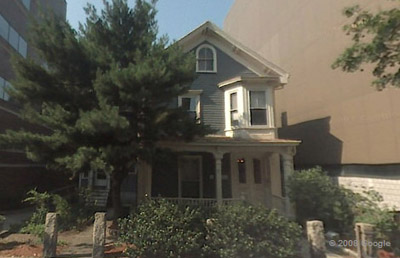
My parents had the front of the second floor, which didn't have enough room for a full-sized bed. But like many old houses, this one came with a window seat (pictured) and a terrible curse (not pictured). The curse worked like this: the house was right across the street from the Orson Welles theater. So at least once a week, some moviegoer would park in front of the driveway, blocking everyone in. And that August, the movie that inspired such careless parking was The Harder They Come, which began an unprecedented seven-year run at the theater that summer. My parents have always said that The Paper Chase—opened that October, set at Harvard Law—was sort of their theme movie for the year, but it seems to me that The Harder They Come had a more direct impact on them, in the sense that they kept having to call tow trucks because of it. So full disclosure requires me to point out that this film caused my family actual, measurable harm. But it's impossible to stay angry at a movie with this much low-rent charm.
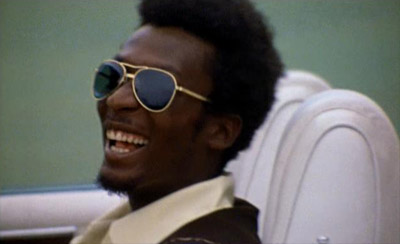
That's Jimmy Cliff, undoubtedly about to park that car in front of my parents' driveway and make my dad late for class. He plays Ivan Martin, a kid from the country trying to make it as a singer in Kingston, Jamaica. Ivan is literally just off the bus:
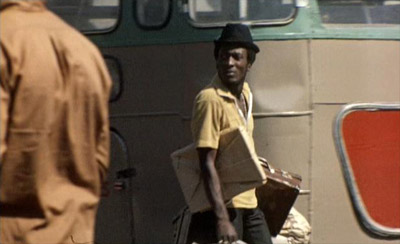
And naïve enough that the first thing he does is load all of his worldly possessions onto the garishly decorated pushcart of a young man who is nice enough to offer to help him carry them. Here's the last glimpse he gets of everything he owns:

Ivan has big dreams, but not a lot of follow-through. On his first day in Kingston, he meets a gambler who is having a suspicious run of luck at dominoes, and that pretty much sums up his chances. Kingston's economy is a rigged game, and nobody makes it from here:

To here:

Ivan's no exception to the rules, but he makes a pretty good show of trying. For the first half of the film, he moves from one unsuitable father figure to another. The first is a ferocious preacher played with brio by Basil Keane:
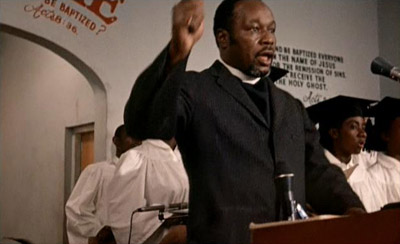
You can imagine how well the preacher gets along with a laid-back reggae fan like Ivan—for one thing he thinks the music Ivan listens to is called "boogie woogie." But living here beats the streets, and Ivan at least manages to scrounge up enough money to buy an unforgettable hat.

You can see where this is going; the preacher has a young ward, Elsa, and his intentions toward her are perhaps not as honorable as he tells himself. She's played by Janet Bartley:
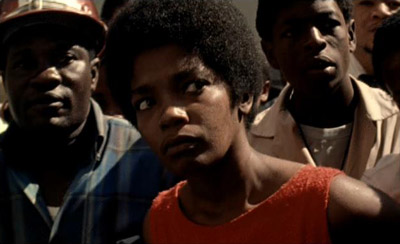
So it's no surprise that the preacher doesn't much like it when Ivan starts taking her out for rides on his bicycle (Sidesaddle! In heels!).

Fortunately, Father Figure #2 swoops in to save the day right when the preacher evicts Ivan. He's a music producer named Hilton, who gives Ivan the chance to make a record, out of pure love for music and enthusiasm about the young man's talent. Look up "avuncular" in the dictionary and there's a picture of Hilton:

I'm just kidding. He does it for the money, giving Ivan a take-it-or-leave-it deal on his single: $20 for all rights in perpetuity. Without Hilton's go-ahead, no DJ will touch the record, no matter how good it is, so Ivan eventually signs it away. That's why you need an entertainment lawyer, kids. You think cars like this pay for themselves?

Shitty deal aside, Hilton does let Ivan record a song, which is as close as he gets to his dream. Here he is in the studio; this footage was shot of Jimmy Cliff actually recording the film's title song.

Which brings us to father figure #3, the only constant, reliable thing in Jamaica:

Ivan gets in on the ground floor in what everyone in the movie just calls "the trade," recognizing that there's little else of value coming out of their country. But as with the preacher and Hilton, he chafes against the raw deal he's getting. Unfortunately for Ivan, authority figures in the drug trade stay in power with harsher methods than preachers or record moguls.1

After Ivan kills a cop rather than be pulled over again, the second, weaker half of the film follows him on the run. He doesn't get to be famous the way he dreamed, but he's famous nonetheless. Luckily for Hilton, this means Ivan's record shoots up the charts while Ivan shoots up the countryside. Ivan is the kind of celebrity publicists dream of: he runs a pretty competent publicity campaign on his own behalf, sending the newspapers photos to run.

As you can see, he's modeling himself on Dillinger and Bonnie and Clyde. And things turned out pretty well for them, right?
The Harder They Come doesn't have an amazing screenplay, but it floats by on the strength of its other qualities. Almost the entire film is handheld, giving it a documentary feel, which in a way, it is. Henzell didn't hire actors to pick through a garbage heap for this shot, he just let his camera roll.
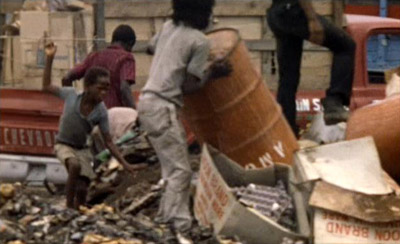
The further Henzell gets from this kind of documentary feel, the more the film suffers; compare his footage of the dump to this shot, from the knife fight that for me, marks the film's low point.

The realism of the rest of the film drowns in terrible fake blood. The gunfights don't play very well either. That means the second half doesn't work nearly as well as the first, because Henzell has a lot of plot he has to move along, which isn't his strong suit. But in the first half, the realism pays off in narrative terms. Henzell doesn't spend a lot of time exploring Ivan's desire to be rich and famous, becahse he doesn't have to. He simply documents the vast gulf between the upper and lower class in Jamaica, and that does his work for him. All it takes is a few carefully chosen details: Ivan has a copy of Playboy in the burnt out car he's made his headquarters; the first thing he does when he gets to Kingston is go to a Spaghetti Western, he looks longingly at a Stratocaster in a display window. Clearly, Western materialism is not serving him well.
I'm not qualified to judge the relative accuracy of Perry Henzell's Kingston or Marcel Camus's Rio de Janeiro, but The Harder They Come feels a lot more real than Black Orpheus. It's not just the camerawork; Henzell also let his actors speak in unapologetically Jamaican patois, so you'll want to watch this with the subtitles on. And then, of course, there's the music. Just as Black Orpheus brought Latin American music to the states, this was the first taste Americans had of reggae music. And the soundtrack is amazing: Jimmy Cliff, Desmond Dekker, and Toots and the Maytals:
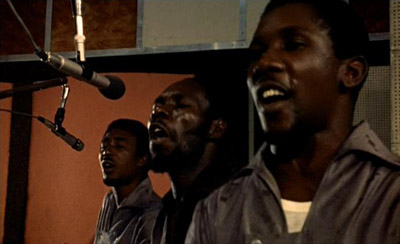
There's no Bob Marley and the Wailers on the soundtrack, but this created a market for "Catch a Fire." I would bet that many more people bought the soundtrack than saw the film, which is actually a pretty fair assessment of their relative merit. The soundtrack is a masterpiece, and the film isn't. But it's still well worth seeing, both for Jimmy Cliff's charismatic performance and Henzell's great footage of Jamaica.
My mother and father would probably disagree with that assesment. In all the time they were in Cambridge, they never crossed the street and bought a ticket. As far as I know, they never bought the soundtrack either. Maybe they didn't want to support the business that kept blocking their driveway, maybe they never found time, or maybe the dealbreaker was my dad's questionable taste in music.2 I like to think there's an alternate universe where they saw the movie, decided it appealed to them much more than The Paper Chase, and I had a very different childhood. But even if that's not how it would have played out, there's a shot in the movie that might have given them some perspective. It's of a corrugated fence on which someone has written:
DONT PISS U URINE
at this Gate
People are Living
here
Thank you
There are worse things in life than a blocked driveway, after all.

Randoms:
- The Harder They Come was nearly remade between 2003 and 2006 on three different occasions, with three different stories and three different stars. Sara Risher, one-time President of Production at New Line Cinema and now independent producer, brought the project to New Line. She was kind enough to sit down and talk with me about its various incarnations; together, they form a nice object lesson in the vagaries of the development process. Though she acknowledged that some of the qualities of the original would be difficult to reproduce, she made a convincing case that the basic outline of the story was timeless enough to be adaptable. The music industry certainly hasn't gotten any less rapacious since 1973. But because the original relies heavily on Jimmy Cliff's charisma, the main task was attaching someone who could carry the movie: an actor who could sing or a singer who could act. Three people were involved at various times:
Mos Def: This version was set in New York City and was to feature dancehall/hip-hop crossovers on the soundtrack. Bryan Goluboff wrote the script, which addressed some of the weaknesses of the original story. For one thing, Goluboff finessed the moment in Henzell's film where Ivan abruptly becomes a cop-killer. I also liked the last image, which would have used a police helicopter's spotlight to directly link Ivan's criminal career to show business. The film had a greenlight, but Mos Def dropped out to make 16 Blocks.
Today, New Line's option has lapsed and the rights have reverted to the Henzell estate (Perry Henzell, a friend of Risher's, died in late 2006). But Risher has the right of first refusal for any future remake, so she may still manage to get it to the screen.
Eve: Risher started from scratch, reimagining the project with a female protagonist. This would have been an interesting take, because Ivan's character is so driven by machismo. Kate Lanier wrote the script, and as before, it was greenlit. Then UPN unexpectedly picked up Eve's eponymous television show for another season, and that was that.
Lauryn Hill: Hill actually approached Sara Risher; she'd heard about the remake and had her own idea for the story. Hill's version was set back in Jamaica, but had an American tourist in the lead. Hill came with built-in reggae credibility; she has five children with Bob Marley's son Rohan. Risher went out to writers for a third time, but before a script was written, Lauren Hill went into seclusion and once again, things fell apart. - This was the first Jamaican film, and so it had a built-in and passionately loyal audience in its home country. It's hard to imagine belonging to a culture that had never seen itself on film, but that's the situation Jamaicans found themselves in in 1972. Perry Henzell reports on the commentary track that audiences were won over in the first sequence, one of those everyday occurances that had never made it to the big screen before. The bus Ivan is taking in to Kingston has a pointless faceoff with a truck on a one lane bridge.

- That shot apparently got audiences to erupt into cheers all over the third world.
- The preacher Basil Keane plays is pretty crazy, but he's got nothing on the real preacher at the church they shot at. There's some footage of him in the movie; a lot of yelling and a whole lot of banging his bible. I kind of wish they'd cast him.

- Beverly Anderson has a small role as a housewife; she went on to marry Michael Manley and become Jamaica's First Lady.

- She's way better than Nancy Reagan on "Diff'rent Strokes." Come to think of it, she's better than Ronald Reagan in Bedtime for Bonzo.
- Perry Hanzell got to make the first movie from Jamaica, an shortcut to critical importance that's no longer available to any of you. But don't despair! There are still countries with no local films. The IMDB lists 190 different countries where films have been produced; the CIA World Factbook lists 266. That leaves 76 countries just waiting for someone to put them up on the big screen. And even if we accept that Factbook regions like "Antarctica", "Clipperton Island," and "Holy See (Vatican City)" are unlikely to become the next Toronto, there's still a lot of potential there. Plus, if you're not from a country with no locally produced films, you might be from one of the ten countries with exactly one locally produced film.3 So if you're one of the 1,492 residents of Niue, the world is waiting for you to produce a followup to your country's first and only film.4 Or at least the Niueans are.
1Well, maybe not modern-day record moguls, but this was filmed before Napster.
2C.F. "Herman's Hermits Greatest Hits." On cassette.
3The ten countries with only one film on the IMDB are:
4Mella Lahina's Niue: This Is Your Land, which appears to have been a student project.
Sunday, February 24, 2008
#82: Hamlet
Hamlet, 1948, directed by Laurence Olivier, screenplay by Laurence Olivier and Alan Dent, from the play by William Shakespeare.
Staging Hamlet requires a special sort of madness, feigned or genuine. It's not just the greatest work in Western literature. It's not just the most fully realized portrait of human consciousness and self-consciousness, with all the miserable paradoxes they entail. The situation's a little more serious. To quote the never-bombastic Harold Bloom, "Hamlet and Western self-consciousness have been the same for about the last two centuries of Romantic sensibility." Embodying Western self-consciousness: now there's an easily achievable goal for a filmmaker! And given that you have no chance of creating a definitive version of literature's "center of centers," one wonders if it's really worth the trouble. I hope no one attempts Hamlet for critical acclaim. It's true that films of Shakespeare inevitably get tarred with the middlebrow prestige brush, but the best one can hope for from serious critics (i.e., those who know Shakespeare well) are left-handed compliments like the one James Agee gave Olivier in his review for Time:
A man who can do what Laurence Olivier is doing for Shakespeare—and for those who treasure or will yet learn to treasure Shakespeare—is certainly among the more valuable men of his time.
I suppose Olivier managed to console himself with his Best Actor and Best Picture Academy Awards, but still. For a critic like Agee, the Oliver Shakespeare films are valuable to the extent they point viewers back to the texts, the platonic ideals. And any account of an individual staging of the play is necessarily a list of ways the specific instance falls short of the general case. To paraphrase the lines Olivier chooses as an epigraph:
...these [productions of Hamlet]
Carrying, I say, the stamp of one defect
Their virtues else—be they as pure as grace,
Shall in the general censure take corruption
From that particular fault.
But like Everest, Hamlet is there, and theatrical minds of all calibers will continue to try to scale it. It was inevitable that Olivier would make the attempt. I'll talk about his film's particular faults in a moment, but first, here's what this version gets right.
It seems to me that the worst mistake you can make with Hamlet is to try to bind it to a specific place and time. The play tells us so much about what it is to be human, and so little about Denmark (and nothing about the 19th Century or, God forbid, Wall Street). Olivier nails this: his Elsinore is an abstraction from the very first shot:

You wouldn't call the costumes or sets minimalist, exactly (that would be its own aesthetic distraction), but they offer no respite from the text's relentless claustrophobia. I've always thought Branagh's lush colors (in 70mm, no less), worked against Hamlet, not for it. In the Olivier version, Roger Furse's sets and costumes and Desmond Dickenson's stark black and white photography work together to make Denmark the prison Hamlet proclaims it.

Dickenson's camera stitches the film together by tracking cooly down empty, narrow hallways from one scene to the next: it's a crib from the cinematic grammar of horror films, used to great effect here.

Even when we leave Elsinore for the outside world, as in Ophelia's death (presented with Gertrude's description as voiceover), we're still dealing with abstraction. Compare Jean Simmons's Ophelia:

To John Everett Millais's:

I suppose you could make a case that the visual quotation is distracting, but consider its import: Olivier is reminding us that we're not seeing the specific death of a young Danish woman, but the archetypical death of Ophelia, one presentation of thousands. The emphasis is on abstraction and timelessness, which I find completely appropriate.
This is not to say that the abstracted sets and costumes mean that Olivier doesn't have his own take on the play. He certainly embraced some of Freud's interpretation, going so far as to cast Eileen Herlie as Gertrude. She was 13 years younger than her putative son, which made the Oedipal overtones in the closet scene pretty easy to play:

Herlie's performance astonishingly good, and she's the focus of the most unnerving choice the filmmakers made. Here's how she toasts Hamlet in Act V:

Her expression was revelatory for me. Of course Gertrude knows the cup is poisoned—she knows more about Claudius than anyone else in the room.
Olivier plays Hamlet indelibly enough that every film version that has followed is compared to his version. He emphasizes Hamlet's brooding melancholy, perhaps to the detriment of his quick wit, which is not as much in evidence here:
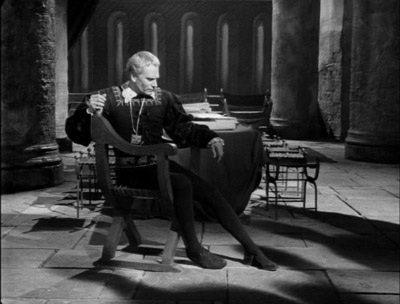
Terrence Rafferty disagrees with me about this; in the essay that accompanies the DVD, he writes
...the striking feature of this performance—as of the whole production—is its atypical vigor: Olivier may be the only actor who has fully recognized that Hamlet’s irresolution has its own fierce energy, and that his morbidity is, at heart, a kind of ardor.
Rafferty's right to note that Olivier gains energy as the play advances, but both Gibson and Branagh gave their versions of the charactor more vigor than Olivier did, and most critics note this (e.g., Roger Ebert: "As for Hamlet, Branagh (like Mel Gibson in the 1991 film) has no interest in playing him as an apologetic mope.") Olivier's portrayal isn't lifeless, but it's a stretch to say it has "fierce energy." Which isn't to say it's a bad performance—I think it's excellent. But I find Rafferty's reading of Olivier's Hamlet bewildering.
And speaking of bewildering, let's get into that inevitable list of ways Olivier's version falls short, and talk about the screenplay. I'm not a textual purist; I have no problem with the hundreds of minor substitutions in Olivier's version (Agee claimed there were only 25, but that seems low). Neither do I mind the cuts: unless you're Kenneth Branagh, filming Hamlet means deciding what to omit. But in most productions, the script is streamlined without being drastically altered. Laurence Olivier and Alan Dent were both certainly capable of trimming Shakespeare without making radical changes—you can see this in Olivier's production of Henry V (which Dent also worked on). But in that case, they had a pretty obvious goal: transform Hal into a national hero that the beseiged Britons could rally behind during World War II. Olivier opens with a similar stab at a unifying purpose, announcing in voiceover that "this is the tragedy of a man who could not make up his mind." But strangely enough, most of the lines that dramatize Hamlet's indecision are missing. And what's left has been shuffled around to the point of incoherence.
It's easy to see what Olivier and Dent were trying for when they rearranged the scenes. As Shakespeare wrote it, Hamlet circles back on itself structurally—if you got coverage on it from a studio executive today, there are lots of scenes that would be excised completely. I.ii, I.iv., and I.v. all have scenes where Hamlet learns about, sees, and talks to his father's ghost; IV.v., IV.vi., and IV.vii. all have scenes of Laertes and Claudius plotting. I can envision page after page of the First Folio with "Do we need this beat again?" scrawled on it. So Olivier and Dent reorganized the play into loosely defined sequences. The part of I.ii. where Hamlet's friends tell him about the ghost has been moved to later, immediately before I.iv. and I.v., forming a loose sequence that might be titled "Hamlet deals with the ghost." The section in II.ii. where the Players arrive and III.ii. (the performance of The Mousetrap) are now adjacent. But while there's less jumping around, this leads to some strange lapses in causality. Olivier and Dent set all the Claudius/Laertes scenes as one giant conversation just after Ophelia's death. But half of the dialogue comes from scenes that are normally before she is dead, so some of the time he seems a little blasé about his dead sister. Still, if you can live with a few off notes, you can make a case that the momentum Olivier picks up by grouping these sequences is worth the cost.
It's harder to defend the outright cuts Olivier has made. Rosencrantz and Guildenstern aren't dead, they've completely vanished. Fortinbras is also missing. And a lot of the plot's mechanics just don't work. The plot to kill Hamlet in England disappears without much explanation, apparently without Hamlet discovering that Claudius wanted him dead. Polonius has to take over Rosencrantz and Guildenstern's investigation into Hamlet's madness, which makes the Hamlet's hostility seem more justified than it should be. And for a production supposedly dedicated to Hamlet's indecision, most of the dialogue that explains why he might be indecisive is gone. You can't write this off completely as a lack of time: Olivier found time to keep Hamlet's acting advice to the players nearly uncut, arguably the most self-indulgent lines in the entire play. But some of the most important information has gone missing, and is sorely missed. Take The Mousetrap, the centerpiece of the play. This is the scene where Hamlet discovers without a doubt that Claudius is guilty; it's a critical moment for him and for the plot. In the text, Hamlet explains what he's up to like this:
...I'll have these players
Play something like the murder of my father
Before mine uncle: I'll observe his looks;
I'll tent him to the quick: if he but blench,
I know my course. The spirit that I have seen
May be the devil: and the devil hath power
To assume a pleasing shape; yea, and perhaps
Out of my weakness and my melancholy,
As he is very potent with such spirits,
Abuses me to damn me: I'll have grounds
More relative than this: the play's the thing
Wherein I'll catch the conscience of the king.
It's expository dialogue, but it's critical information, especially if you're focusing on Hamlet's indecison. But in Olivier and Dent's screenplay, all this is gone except the last couplet, which Olivier delivers as a triumphant yell.

The mousetrap scene itself is the highlight of Desmond Dickenson's cinematography, which is marvelous throughout. The camera tracks back and forth in a lazy semicircle around the audience and stage, settling right behind Claudius as the poison is poured into Gonzago's ear, looping over to see Hamlet and Ophelia's reaction, and eventually tightening its path to focus on Claudius as he rises from his chair. It's sickeningly well staged. But let's say you've decided that your version of Hamlet is about "a man who could not make up his mind." This should be the main reaction shot of your movie. But instead of showing any kind of realization on Hamlet's face when Claudius yells for light, Olivier actually runs up and sticks a torch in his face, laughing demonically.

Played like this, Hamlet seems to have staged The Mousetrap strictly to torment Claudius. To me, that feels sadistic, not indecisive. I kind of like that reading, but it means that Olivier's epigraph is bullshit. Rafferty notes that Olivier took to calling this movie "a study in Hamlet," rather than trying to pass it off as a definitive version. I think that's probably the best way to think of it; it certainly shouldn't be the only way anyone experiences the text. (As an ex-English teacher, let me be clear: don't confuse studying "a study in Hamlet" with "studying Hamlet. N.B., lazy high school students: you want the Branagh version). Still the idiosyncracies of Olivier's version are thought-provoking enough to make it well worth seeing, assuming you're familiar enough with the play to fill in the gaps. And the individual scenes (especially between Hamlet and Gertrude) are magnificent. Put it this way: it has interesting acting, brilliant staging, and absolutely perfect cinematography, all in the service of a text that's a bit of a hash. If you know the play well, the liberties Olivier and Dent take aren't going to be a problem. If you don't know Hamlet well, you should probably quit reading blogs about movies and get to know it well. But Olivier's Hamlet won't help you much.
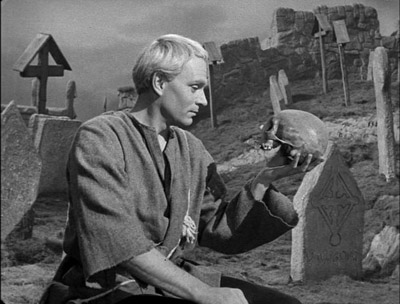
Randoms:
- Straight from the IMDB:
The final scene to be filmed was the famous shot of Olivier jumping off a high tower onto Claudius and killing him, because it was considered to be so dangerous that it was feared that Olivier would injure himself too badly performing the stunt to film any other scenes. Olivier emerged uninjured from the leap, but the stuntman doubling as Claudius was knocked out from the impact and lost two teeth.
And here it is:

- Speaking of uncredited performers like that poor toothless stunt-Claudius, this was one of the first appearances of the inimitable Christopher Lee. He's listed as a "spear-carrier," and I believe this is him (the still is from Hamlet's "mother and father is one flesh" speech from IV.iii.):

- He doesn't look much like Saruman or Count Dooku, or even the Hammer Dracula there, but compare the nose and cheekbones to this headshot from about ten years later (image stolen from here):

- That's gotta be him.
- And speaking of Hammer films and Star Wars (and cheekbones, for that matter), the most incongruous casting is Peter Cushing, as Osric. Osric is one of Shakespeare's most foppish characters. Branagh gave the role to Robin Williams, which should give you a pretty clear picture of the kind of manic silliness most actors bring the part. So this is your chance to see Grand Moff Tarkin at his most cheerful.

- Here his cheekbones look a little more Tarkinesque:

- And speaking of Lord of the Rings films, it seems to me that Peter Jackson's Ringwraiths:
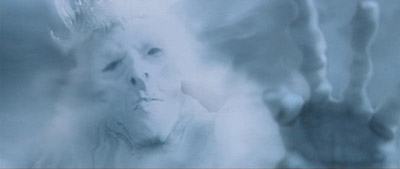
- Owe a bit to Olivier's version of Hamlet's ghost, who looms over Elisnore in a similar fashion:
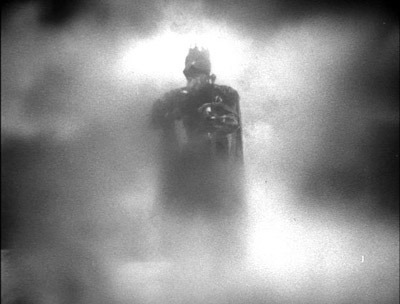
- And looks particularly familiar in close-up:

- I mentioned that Desmond Dickenson's cinematography looked a lot like what you'd see in a horror film. Apparently, horror film directors noticed: he went on to shoot Meet Mr. Lucifer, Horrors of the Black Museum, The City of the Dead, Trog, Tower of Evil, and Murder Ahoy. That last one is more of a mystery than a horror film, apparently, but still, what a title!
- Felix Aylmer's Polonius is pretty definitive. He doesn't capture any amazing insight into the character, but he's the best incompetent busybody I've seen (and his delivery of the list of genres the players know is perfect). Here he is at a typically self-important moment:

- Rafferty notes that the final duel has "an unsettling erotic charge." I think he may have just been confused by Laertes's unsettling codpiece.
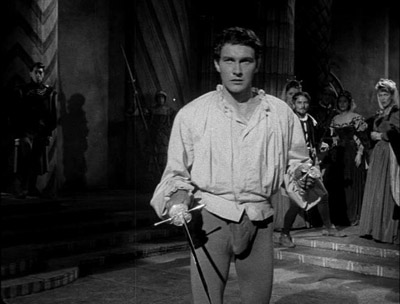
- Jean Simmons's version of Ophelia has not aged well. She's fine towards the beginning, but the mad scenes are difficult for anyone to sell, and viewers raised on method acting are unlikely to be impressed. That's true of most classically acted mad scenes, of course, so you can't really hold it against her.

- She'd previously played Estella in Great Expectations and this performance captures her at a critical point in her career. James Agee seemed quite taken with her, and gives her a lot of space in his review. But he had concerns about her career path:
We know what we are, the mad Ophelia says, in one of the most bemusing lines in the play; but know not what we may be. It is clear to Olivier, as to many others, that Jean Simmons is "an exceptionally bright and promising actress." It is not so clear what she may become. Olivier offered her the chance of a lifetime: a modest and gradual seasoning, first in minor roles, then in larger ones, at the Old Vic in Bristol. There is probably no more propitious training ground for legitimate acting in the English-speaking world. However, Jean has signed a five year, million-dollar contract with J. Arthur Rank. She will next appear in The Blue Lagoon, in which she wears a sarong, and dies, after having an illegitimate baby in a rowboat, somewhere in the South Pacific.Now that's dry reviewing.
Thursday, January 17, 2008
#81: Variety Lights
Variety Lights, 1950, directed by Federico Fellini and Alberto Lattuada, screenplay by Federico Fellini, Alberto Lattuada, and Tullio Pinelli, story by Federico Fellini.
The showbiz movie has two basic archetypes, positive and negative. In the positive version, an innocent gets discovered and rises to the top: the conflict comes when they have to choose between violating some core principle and taking some kind of short-term gain—Singin' In The Rain is probably the best example. The flip side of the mirror are the movies where a ruthless protagonist slimes his or her way to the top; think of All About Eve or The Player. But while the positive and negative archetypes may portray show business at different levels of toxicity, there's never any question of its seductive power. Half the appeal for the viewer (especially in the negative showbiz movies) is the chance to vicariously experience the power and the glory of the entertainment industry. What makes Variety Lights so charming is its version of power and glory. Here's Checco Del Monte as we first see him, embodying all the irresistable glamour of third-rate post-war Italian vaudeville:

He's not exactly Joel Grey in Cabaret. Checco is played by Peppino De Filippo, and that's as dignified as his character gets. He's the capocomico of a troupe whose appeal is becoming more selective. It's hard to imagine why; not only do they have Checco's singing, they have Giulio Cali's fantastic magic act:

His big trick is eating a lightbulb.

And if that's not enough to seal the deal, there's the act that gets the largest print in the posters... TUTTI A BIKINI!

It's as glamorous as the "Dignity... always dignity!" flashback in Singin' In The Rain. But while Don Lockwood and Cosmo Brown both go on to bigger things, for Checco and the rest of his troupe, the performance that opens the film is their finest hour. Fortunately, they reach at least one member of the audience, Carla Del Poggio's Lily Antonelli, who applauds the show's cheesy finale like it's Jesus coming back from the dead.

Lily tracks Checco and his company down on the train to their next show and explains that she is eminently qualified to perform with them: she was the winner of a local dance marathon ("I had to stop because the others did, but I wasn't tired at all"), she was elected Beach Queen, and a local paper said she had "legs like Maresca."1 Sterling qualifications, to be sure, and Checco is suitably indifferent, even when she hands him a stack of glamour shots and shows him her legs in person. She finally makes an impression when she rents a cart for the whole (flat broke) company and saves them several miles of walking. This gesture convinces Checco to give her her big break. She takes full advantage, first upstaging the prima donna:

Then winning the hearts and groins of her audience with a convenient (but accidental) wardrobe malfunction:

Needless to say, Checco knows talent when he sees it, and Lily quickly becomes the company's star attraction. This doesn't go over well with the rest of the act, but it especially doesn't go over well with Checco's sort-of-fiancée, Melina Amour. She's played by Fellini's wife Giulietta Masina, and if you remember Nights of Cabiria you know that no one plays long-suffering like Giulietta.

Of course, it's apparent that Checco's world—where success means staying on for a repeat performance of "TUTTI A BIKINI!" for an audience of farmhands—won't satisfy Lily for long. You can actually see the moment when she decides he won't be able to get her where she wants. He's taking her around Rome, trying to put a new production together, and booking agents are roundly ignoring him. He plays things cool, but she looks around appraisingly at the other agents:

It's a beautiful moment. Although Lily does turn into something of a monster over the course of the film, this is an altogether gentler film than All About Eve, and even at her worst, there's something charming about her. Checco's a rube, but he's still seen a lot more of the world than she has. She knows enough about the best of everything to order lobster and champagne when Checco takes her out:

But after one sip, she says, surprised, "It tastes just like soda!" and orders a beer instead. In short, Checco should know better, but Lily clearly doesn't. And so the film doesn't fit the mold of the negative showbiz movie: it isn't about Lily's megalomania, but about Checco making a fool of himself. Let's be clear: this is not a man with a lot of dignity to spare:

But he does have the one thing you can't afford in the entertainment industry: sentimentality. Although he treats Melina Amour terribly, he unfortunately seems to see Lily as something more than a means to an end.

Watching the gap widen between Checco's version of Lily and the genuine article will be a familiar experience for anyone who's had a good friend go off the deep end for the wrong person. And when you're emotionally invested in someone who's using you, you can always fall lower.

I'm making this sound like an unpleasant film about unpleasant people, and that isn't the case at all; whatever happens, it's clear that the filmmakers have tremendous affection for all the main characters. So they all get a happy ending, at least from their own perspectives, even Lily. She achieves the success she's always wanted; when we last see her, she's dripping with fur:

Which is considerably more than she wears onstage.

And Melina may have lost her savings, but she's doesn't seem to be too unhappy about it.

Neither is Checco, for that matter. He's put his old troupe together for a grand tour: they're playing Bisceglie2, Molfetta, and posssibly even Trani. He's also still letting Melina take care of him, but at the film's end, we see him flirting with another would-be actress. This is where the Fellini and Lattuada stumble: like Melina, they forgive Checco too much. He's squandered Melina's libretto postale and dashed her dreams of running a salumeria. While it's credible that Melina would have him back (it's clear she can't deny him anything), and he's clearly incorrigibly foolish, it's asking a lot from your audience to try to wring a lighthearted tone from his disastrous moral failures. It's a testament to the filmmakers that they almost pull off this ending, but ultimately I wasn't quite sentimental enough about Checco. It's probably churlish to play the sentimental card, given that we're talking about Italy circa 1950; it wasn't exactly a mecca for cold-eyed rationalists. You can read Luigi Barzini's The Italians, for a book-length exegisis of what I'm talking about,3 or you could just observe that in Variety Lights, an audience is brought to tears and a standing ovation by Melina Amour's singularly unconvincing impression of Garibaldi:

So the film's treatment of Checco is a product of its time and place. Sometimes the filmmakers seem to be aware of this, and sometimes they aren't. It's not a keenly observed character study, and it's not Nights of Cabiria. But Variety Lights mostly gets by on likeability and low-rent charm. A lot like Checco. Or Italy.
Randoms
- Fellini and Lattuada do a wonderful job of capturing the feeling of life on the road. One of the film's high points is an impromptu banquet at the estate of a man who enjoyed the show. Pasta, meat, and lots of Parmigiano Reggiano.

- There's a great shot of the meal that has no conversation, just the sound of lots of people noisily chewing. Of course, the evening ends with Checco throwing a fit and getting everyone thrown out without a decent night's sleep. But that seems a fair trade-off for the food.
- Variety Lights features Johnny Kitzmiller (aka "the only black man in Italian cinema") playing a prototype of the "magical black man" character so beloved inn American films. He shows up out of nowhere to give Checco hope and inspiration (he's wandering around Rome in the middle of the night playing trumpet, no less). More interesting is Joseph Falletta's portrayal of the"magical Mexican sharpshooter."

- Coincidentally, a magical Mexican sharpshooter is the one thing that could have saved The Legend of Bagger Vance.
- A word about Johnny Kitzmiller's appearance. He tells Checco that he was a chemical engineer in the states ("a darn good job!"), but "I like music, so I came to Italy." Kitzmiller grew up in the states; you would think he'd have pointed out to Fellini and Lattuada that a black chemical engineer—who would have had to fight tooth and nail to get that education and that job—probably wouldn't quit on a whim. Not to mention his unlikely decision that the best place for a black man to play jazz trumpet in 1950 (that's the time Miles Davis was recording the singles that ended up on Birth of the Cool, if you keep track of these things) was Italy. Or as I like to call it, the "land of jazz."
1Probably this was a reference to Lidia Martora Maresca, an actress who seems to have been Peppino De Filippo's lover. Anyone know for sure?
2Not "Bisceglia," as the subtitle has it, but this place. Note that all three stops of Checco's tour are on a ten-mile stretch of railroad track.
3Particularly his chapter on family life—he calls Italy a "crypto-matriarchy," which is still apt.

